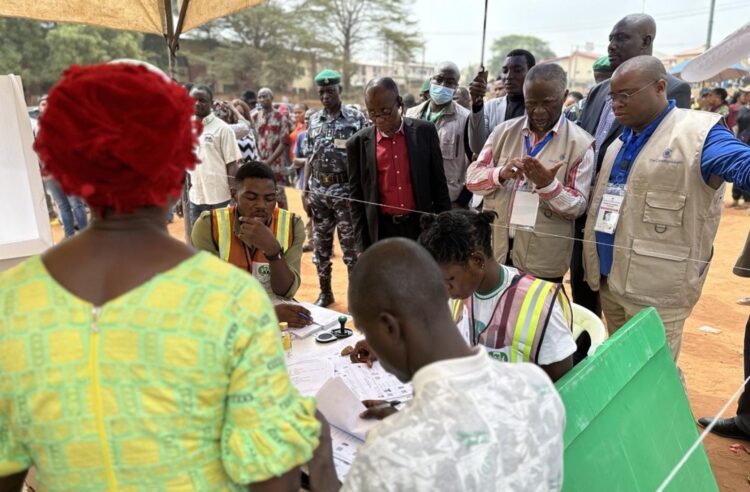By Martin Cole-
Visa bans imposed by the United States on Nigerian politicians involved in obstructing the country’s 2023 elections is a positive step, but has been deemed relatively weak without mentioning names.
February’s elections were characterised by violence , voter’s suppression, snatching of ballot boxes, and mutilation and manipulation of results. Critics deemed it one of the worst elections in the history of the country.
In reality, every election in Nigeria and most African country’s takes its inhabitants back to the dark ages. They always feature corruption on a mass scale, with police visibility ridculously scarce.
Many have accused highly placed politicians
The imposition of visa bans is believed to send a strong message that the United States stands firmly in support of democratic principles and fair elections, but some critics say it is not enough.
Publicly revealing their identities does more to confirm the public claim, according to analysts observing .
Researcher and teacher, Joshua Lockwood told this publication: ”By targeting politicians involved in obstructing elections, it demonstrates a commitment to holding individuals accountable for their actions and discourages future election interference. It can also help foster a culture of transparency, accountability, and respect for democratic processes in Nigeria, but if the names of those under bans are kept secret, it is difficult to asses the full impact of the ban or to even confirm that all the main suspects have been included in the ban.
”In a country that displays the level of corruption as in Nigeria, evidence has to be crucial”.
Analyst and Nhs worker Amber Smart told this publication: ” The visa bans act as a deterrent, signalling to politicians that there are consequences for undermining democratic practices. This can discourage potential wrongdoers from engaging in electoral misconduct, thereby protecting the integrity of the electoral system. The fear of being barred from entering the United States, a desirable destination for many Nigerian politicians, can serve as a powerful disincentive to engage in election-related malpractices.
”However, it goes without saying that identifying the individuals is also important to ascertain the scope of the visa bans, and be sure nobody who should be included has been left out. The expectation from the U.S that they should be trusted to have applied the ban fairly and broadly enough is a mistaken one”
A journalist from BBC Africa who insisted on anonymity said: ”I think it is understandable that the U.S have decided not to name those banned. It could potentially lead to a diplomatic crisis. If for example, the president-elect , Bola Tinubu was included in the visa ban, it would not be very prudent to announce that to the whole world because hate or like him, until a court overrules his election victory, he is the next president of Nigeria. The inauguration is brely weeks away”.
”We must also remember many of their diplomats still have to live in Nigeria, which can be a dangerous country.
International Pressure and Cooperation
Visa bans put pressure on Nigerian politicians by attracting international attention and scrutiny. The action taken by the United States can encourage other countries to follow suit, creating a united front against election interference. This multilateral approach increases the chances of reform and cooperation among nations to promote free and fair elections globally.
One unrguable disadvantage of not disclosing the names of politicians on the ban list is the lack of transparency. In the absence of transparency, the is potential for confusion and suspicion, as individuals might speculate about the identity of those banned. This lack of clarity can hinder public trust in the visa ban process, leading to scepticism about its effectiveness and fairness.
It is also impossible to tell whether all the guilty parties have been subjected to bans or whether some have bought their way out of punitive actions.
Other critics have suggested that it is more important for countries like the U.S to take steps to improve democracy in rogue African countries like Nigeria and support election processes that make it difficult for voter suppression and electoral fraud.
The efficacy of visa bans as a deterrent may be limited if the affected politicians do not have strong personal ties or ambitions involving travel to the United States. If their international interests are minimal, the visa bans may have a reduced impact on their behaviour or political activities. Additionally, if these politicians can find alternative routes or countries to pursue their interests, the bans might not hinder their actions significantly.
Visa bans on Nigerian politicians involved in obstructing elections hold both importance and disadvantages. On one hand, these bans emphasize the commitment to democratic principles and act as a deterrent against future election interference. They also exert international pressure and encourage cooperation to promote free and fair elections globally. On the other hand, the lack of transparency and unintended consequences can hinder public trust and inadvertently strengthen the political influence of banned individuals.
Some critics have suggested that limitations of the bans’ impact on politicians with limited international interests may reduce their effectiveness.
To strike a balance, it is crucial to ensure transparency in the visa ban process while safeguarding innocent individuals from unjust consequences. It is also important to supplement visa bans with comprehensive efforts to strengthen electoral systems, promote civic education, and encourage
Greater political accountability in Nigeria. Addressing the root causes of election obstruction and promoting democratic values, lasting change can be achieved. Additionally, international collaboration and support can play a vital role in assisting Nigeria in its efforts to ensure free and fair elections.
Overall, the imposition of visa bans on Nigerian politicians who obstructed elections represents a step towards upholding democratic principles and deterring future election interference. Balancing the need for accountability with fairness and transparency is essential for the effectiveness and credibility of such measures.

